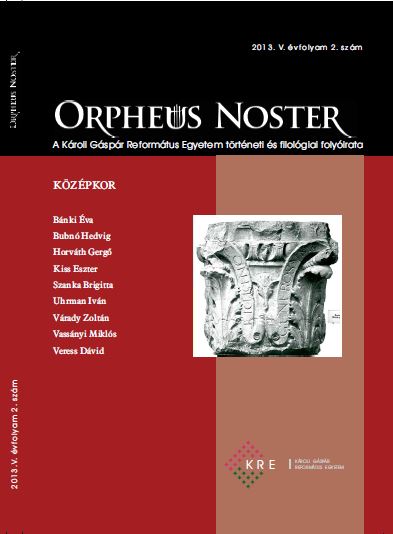Rómaiak vagy barbárok? – Akkulturáció és kultúramegőrzés a barbár államokban, különös tekintettel az afrikai Vandál Királyságra
Romans or Barbarians? – Acculturation and Maintenance of Culture in the Barbarian States, with Special Regard to the Vandal Kingdom
Author(s): Hedvig BubnóSubject(s): History, Cultural history, Middle Ages, 6th to 12th Centuries
Published by: Károli Gáspár Református Egyetem
Keywords: barbarian rulers; barbarians in Europe; Roman Empire; Roman culture; Romanised Africa
Summary/Abstract: The aim of this study is to present how the barbarian rulers, together with the aristocratic or civil servant layer, tried to maintain and hand the Roman culture down in the barbarian kingdoms, created on the Roman empire’s territory in the 5th and 6th centuries. The rulers, more or less established in the territory of the empire, did not destroy the natural and cultural goods of the occupied territory, but wanted to enjoy them. They were aware of the magnificence of the centuries old culture, several times expressed their admiration for Byzantium or Rome with their actions or words, and in their courts Roman and barbarian ceremonial elements were mixed. The German rulers of the western empire’s parts employed Roman rhetors, lawyers and poets in their courts. Neither was it against the interests of the local Christian élite to serve the monarchs as it proved to be a more important consideration to keep the cultural unity of the whole Mediterraneum. The Romanised African area with some important Christian roots receives a special attention in the present study, due to the contradiction between the negative connotation of the Vandal name and the continued cultural literary-philosophical life, according to the testimony of sources. Carthage in the 4th and 5th centuries actually experienced a Latin poetical renaissance. The texts of Anthologia Latina, compiled at the end of the Vandal period, bear testimony of the living Roman conventions as well as architecture and cultural support of the Vandal rulers. The monarchs expected the poets to praise them and to exploit their talent for the elevation of the glory of the kingdom. On the other hand, the poets, in order to satisfy the rulers’ vanity, encouraged them to imitate the emperors. The authors of this period wrote their works following their predecessors’ examples, that could possibly survive them, too, but they could contribute mainly to the survival of literature in the middle of an unstable and changing world.
Journal: Orpheus Noster. A KRE Eszme-, Kultúr-, és Vallástörténeti Folyóirata
- Issue Year: V/2013
- Issue No: 2
- Page Range: 15-29
- Page Count: 15
- Language: Hungarian

